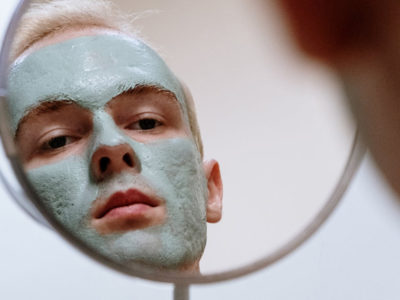Table of Contents[Hide][Show]
The signs of winter are plain to see: wool scarves hanging by the door, shimmering snowflakes, a crackling fire, and itchy, flaky skin.
Unfortunately, as the temperatures drop so does the humidity. The lack of moisture in the air is reflected in your dermis, leading to skin that is often painfully dry, chapped, and even cracked.
But the cooler months don’t have to wreak havoc on your skin. We’ll share everything you need to know for treating dry skin so you can have it smooth and glowing again in no time.
Causes of Dry Skin
Your skin feels dry when it’s having trouble retaining moisture. And while there are many possible causes for dry skin, the majority of them are environmental.
Weather is a huge factor. If you live in a region that has cooler climates, you’re no doubt familiar with the seasonality of dry skin, from chapped lips to red patches on your body.
But your skincare routine and everyday habits (like taking scalding hot showers) can also cause your skin to lose moisture and become dry and tight. Most likely, your dry skin is caused by a combination of all these factors.
The good news? With the right products and habits, you can go back to the healthy skin you love.
1. Shower and Bathe with Care
Your body receives natural hydration from sebum, an oily substance produced and secreted by the sebaceous glands. It combines with fat molecules (lipids) and forms a protective, hydrating barrier on your skin.
During hot, humid months, this light layer of sebum can cause your skin to break out. And during cold or dry months, your body’s natural oils will keep your skin from getting too dry.
Unfortunately, if your baths and showers are too long or too harsh you risk stripping away your body oil, leaving your skin unprotected and dehydrated.
To maintain your body’s natural hydration, here are some winter skincare tips for the shower and bath:
- Keep showers and baths short. Ideally, they should last no more than 5-10 minutes.
- No doubt, standing under hot water feels extra good on a cold day. But hot water will rinse off more of your sebum, so choose warm water instead.
- Avoid harsh soaps. Try to use mild cleansers, moisturizing body washes or even soap-free options such as Cetaphil.
- We love a good bath sponge, too. But the rough sponges, scrubbing brushes, and coarse washcloths that slough off dead skin also removes sebum.
- After your bath or shower, pat or blot your skin dry. Don’t rub too hard, or you’ll rub the sebum right off.
It’s also a good idea to use fragrance free laundry detergents for sensitive skin. This lack of allergens on clothes will lessen itchiness or or other annoying symptoms of dry skin.
2. Three Words: Moisturize, Moisturize, Moisturize
When the dry air is zapping your skin’s natural oils, you may have to replace it with other sources of moisture. Skincare products such as creams, lotions, and moisturizers can rehydrate your skin throughout the day and even overnight. When used after a shower or bath, they can help seal in moisture and prevent dry skin.
Generally speaking, the thicker and greasier your moisturizer feels, the more it will hydrate your skin. Lotions are generally the lightest and have a higher water content. Creams and ointments are heavier and will be more effective.
There are three types of ingredients commonly found in moisturizers.
- Humectants, which attract moisture: ceramides, glycerin, sorbitol, hyaluronic acid, and lecithin
- Occlusives, which seal in moisture: petrolatum, silicone, lanolin, mineral oil, beeswax, and shea butter
- Emollients, which smooth skin for better moisturizer absorption: linoleic, linolenic, and lauric acids
Read labels carefully so you can be sure your favorite moisturizers will be effective in the fight against dry skin. And remember that more expensive isn’t necessarily better. There are plenty of highly effective moisturizers available at the pharmacy or grocery store. Coconut oil or petroleum jelly, for example, are excellent moisturizers!
Related
14 Beneficial And Harmful Chemicals Your Skin Absorbs
Ever wonder what chemicals the skin absorbs and how they affect your health? Learn which chemicals in skincare to avoid and those that are safe.
3. Eat Hydrating Foods
“You are what you eat!” still holds true, and hydration starts from the inside. The result? The right healthy foods and essential nutrients can be effective dry winter skin remedies.
Omega-3 Fatty Acids
Scientists have been reporting on the health benefits of omega-3 fatty acids for the past few years, so it’s likely not the first time you’re being told to eat them. When consumed, these healthy fats help improve cardiovascular functions, joint functionality, and brain performance. They’re also great for your skin’s moisture.
Omega-3’s actually limit water loss in your skin cells, making them the ultimate barrier to drying winds and dehydrating heaters.
One food rich in omega 3 is salmon. Not all salmon is created equal, however, since farmed fish have a different diet from their wild ancestors and are therefore not an equivalent substitute. Stick to wild salmon to get your omega-3s, but if you’re looking for some variety it’s far from your only option. Herring, cod, and trout are all great sources of omega-3’s, and they can also be friendlier to the wallet.
You can also get a vegetarian omega-3 fix from eating olive oil, avocados, walnuts, and free-range eggs. Try this recipe for salmon with avocado salsa to pack a serious omega-3 punch.
Related
Why Is Omega-3 A Good Idea?
“You have to get in your omega-3s!” These days, we hear this a lot from anyone who is health-minded. But what are omega-3s exactly? Omega-3 fatty acids are some of the best types of fat you can get. There are three different kinds of omega-3s: eicosapentaenoic acid (EPA), docosahexaenoic acid (DHA) and alpha-linolenic acid (ALA). …
Vitamin A
Considering the amount of spinach Popeye consumed, it stands to reason that the fictional character would have had incredible skin. The dark, leafy green is an excellent source of vitamin A, an essential nutrient that keeps your skin hydrated.
Vitamin A is essential for keeping your eyesight sharp and providing a strong defense against many preventable skin diseases and infections. Phytochemicals and folates found in spinach, kale, chard, and other dark leafy greens make them excellent sources of vitamin A.
The beta carotene form of vitamin A is also a great source of the vitamin, and can be found in carrots, egg yolks, peas, apricots, pumpkins, and squash. Try this kale, spinach and feta pie is a shoe-in for a serious vitamin A fix.
Vitamin C
She’s not just a singer from the 1990s. This vitamin is actually the most plentiful antioxidant in your skin.
Vitamin C is hydrophilic, according to this article originally printed in Indian Dermatology Online Journal in 2013. This means that vitamin C already lives within the aqueous chambers of your skin cells, maintaining hydration. When moisture is zapped from your skin by the windy, cold weather of winter, you need to top up that vitamin C. It’s an excellent way to get your skin back on track with its active moisture duty.
Tropical fruits such as mangoes, pineapples, and kiwis are an excellent source of vitamin C, but you can also get your daily dose with many varieties of berries and citrus fruits. This recipe for a breakfast fruit salad pizza is great for packing a bunch of vitamin C-packed seasonal fruits.
Lutein
This vitamin is a close relative to vitamin A and beta carotene. It’s perhaps best known as “the eye vitamin,” since it’s used to prevent eye diseases such as macular degeneration, but the vitamin is also great for your skin.
Lutein helps to improve the hydration and elasticity of skin, according to Medical News Today. You can get lutein in a variety of sources, such as cooked spinach, kale and even corn. Eggs just may be the best source of moisturizing lutein, though, since it’s effective both consumed or applied topically to your skin as a facial mask. This recipe for healthy huevos rancheros is a great way to get your lutein consumption on.
Foods to Avoid
Just as the foods above enhance your natural hydration and combat dry skin, there are foods that will leave you dehydrated and undermine your best efforts.
- Reduce or avoid junk food, since packaged treats contain dehydrating refined sugars that zap skin of moisture.
- Limit known diuretics (drinks that rid the body of extra water by increasing urination) such as black coffee and green tea. Stick to water!
With limited junk food and the appropriate amounts of the aforementioned vitamins and minerals, you’ll lose your reptilian status once and for all.
Related
6 Tips To Stop Being A Junk Food Junkie
Want to end your junk food junkie life? You can teach yourself how to stop eating unhealthy foods with these tips!
4. Keep Your Environment Humid
It’s easy to see the effects of humidity in the summertime: shiny skin, frequent breakouts, and the dreaded frizzy hair. Cooler air, though, holds less moisture. Great for your hair, maybe, but not great for your skin!
When the air isn’t as humid (such as in the winter), it pulls moisture from other sources. This includes any moisture in the environment—including on your skin, leaving it feeling absolutely parched.
But if you can amp up the humidity in your home, you’ll protect your skin’s hydration.
- Invest in a humidifier to add moisture back into the air. A setting between 30% and 50% is ideal for keeping your skin hydrated.
- When you take a warm (not hot!) shower or bath, shut the door. This will keep you surrounded by warm, humid air for longer.
5. Protect Problem Areas
Some parts of your body will be more exposed to the cold outdoor air, making them more susceptible to dryness.
- Wear gloves to protect your hands when you’re outside. You can also get dry hands from constant handwashing (this doesn’t mean you should wash your hands less often). Slather on hand cream, often.
- Use moisturizing lip balm or chapstick. Natural products containing beeswax are great for hydrating your lips!
- Use a facial moisturizer every day, morning and night. If you’re trying to avoid a greasy look during the day, use a light moisturizing lotion in the morning and a heavier cream-based one when it’s time for bed.
Final Thoughts
The winter months are tough, but you don’t have to suffer with dry, flaking, or itchy skin.
Adopting some (or all) of our dry skin tips will help you restore your skin’s moisture and protect its natural hydration. Prioritize hydration as part of your everyday routine; be consistent with your skincare and nutrition, and your skin should start to feel better quickly.
You’ll soon start to love the skin you’re in!
You May Also Like…







